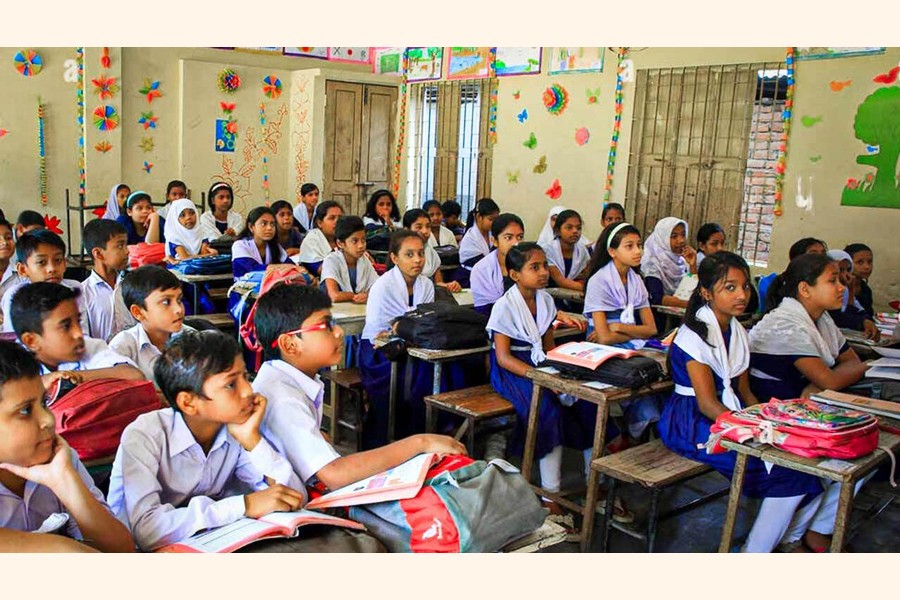
Published :
Updated :

The global educational landscape has undergone a profound transformation, moving decisively away from rote-learning systems to a creative, student-centric pedagogical methods that promote holistic child development. This global shift prioritises teaching methodologies that nurture essential 21st-century skills such as critical thinking, problem-solving, creativity and collaboration.
But Bangladesh's education system, instead, remains largely rooted in traditional rote-learning practices. Although the creative education method was introduced in 2009 to reduce students' dependence on memorising, it has not been fully implemented due to several shortcomings. Chief among these are teachers' limited understanding of creative teaching methods, weaknesses in question paper design, and the tendency of many educators to encourage memorising over comprehension.
Against this backdrop, researchers have recommended extensive training to help teachers gain a clearer understanding of creative teaching approaches, alongside the incorporation of effective, innovative methods into the curriculum to foster creativity among students. Continuous professional development is crucial in this regard. Teachers must regularly update their knowledge and teaching techniques to adapt to evolving educational needs. A well-informed teacher naturally brings more ideas and energy into the classroom. With today's abundance of online learning platforms and resources, teachers have huge opportunities to develop themselves and explore innovative pedagogical practices.
It is, however, unfair to blame teachers alone for any lack of creativity. A system might be changed overnight, but not people and their skills. Creativity is hardly ever spontaneous, neither an innate trait; it requires time, effort and cultivation. It is something that must be nurtured through consistent practice, encouragement and institutional support.
Music and physical education are recognised globally as integral to children's mental and physical development at the primary level. In Bangladesh, educationists and child rights advocates have long argued for their inclusion in the curriculum. Responding to these calls, a policy decision was made in 2020 to appoint music and physical education teachers in government primary schools. Accordingly, the government had approved a policy to recruit music and physical education teachers in primary schools. However, just two months later, it reversed this decision, abolishing the newly created posts and prompting many educators, cultural activists and child rights organisations to protest, demanding the reinstatement of music and physical education teachers.
Apart from sports and music, arts can also play a vital role in the teaching-learning process, but these subjects remain largely informal and undervalued in Bangladesh's primary education system. Twentieth-century German philosopher Ernst Cassirer highlighted the significance of art, noting that "Science gives us order in thought, morality gives us order in action, and art gives us order in the apprehension of visible, tangible and audible appearances."
Scientific research supports this view. Studies have shown that early exposure to visual art, music, and drama activates multiple areas of the brain and strengthens problem-solving and critical thinking abilities. Arts education enhances students' academic performance, fosters imagination, and improves overall emotional well-being. Moreover, it supports understanding across other subjects - from mathematics and science to language and geography - by developing cognitive flexibility and creative reasoning.
Beyond academics, engagement with art, music, and sports has profound psychological benefits. Unlike adults, children often struggle to express complex emotions verbally. Creative activities provide them with healthy outlets to communicate their feelings, imagination and dreams. Such activities help channel negative emotions, reduce anxiety and nurture a sense of joy and self-assurance.
If Bangladesh is to build a generation capable of innovation and independent thought, creativity must be placed at the heart of its education policy. That means the government needs to invest more in teacher training and promote a classroom environment where joyful learning and exploration are valued more than committing to memory. Only then students will be inspired to think, imagine and new things.
aktuhin.fexpress@gmail.com


 For all latest news, follow The Financial Express Google News channel.
For all latest news, follow The Financial Express Google News channel.